Related Research Articles
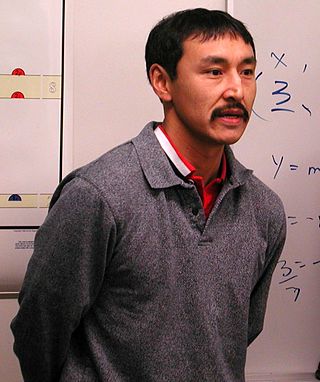
Paul Okalik is a Canadian politician. He is the first Inuk to have been called to the Nunavut Bar. He was also the first premier of Nunavut.
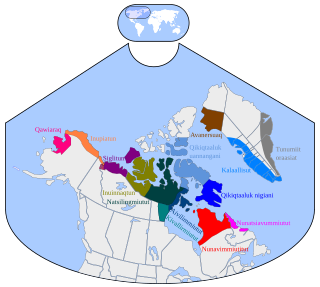
Inuinnaqtun is an Inuit language. It is spoken in the central Canadian Arctic. It is related very closely to Inuktitut, and some scholars, such as Richard Condon, believe that Inuinnaqtun is more appropriately classified as a dialect of Inuktitut. The government of Nunavut recognises Inuinnaqtun as an official language in addition to Inuktitut, and together sometimes referred to as Inuktut. It is spoken in the Northwest Territories as well and is recognised as an official language of the territory in addition to Inuvialuktun and Inuktitut.

Kitikmeot Region is an administrative region of Nunavut, Canada. It consists of the southern and eastern parts of Victoria Island with the adjacent part of the mainland as far as the Boothia Peninsula, together with King William Island and the southern portion of Prince of Wales Island. The regional centre is Cambridge Bay.

Cambridge Bay is a hamlet located on Victoria Island in the Kitikmeot Region of Nunavut, Canada. It is the largest settlement on Victoria Island. Cambridge Bay is named for Prince Adolphus, Duke of Cambridge, while the traditional Inuinnaqtun name for the area is Ikaluktutiak or Iqaluktuuttiaq meaning "good fishing place".

The Coppermine River is a river in the North Slave and Kitikmeot regions of the Northwest Territories and Nunavut in Canada. It is 845 kilometres (525 mi) long. It rises in Lac de Gras, a small lake near Great Slave Lake, and flows generally north to Coronation Gulf, an arm of the Arctic Ocean. The river freezes in winter but may still flow under the ice.

Kugluktuk, known as Coppermine until 1 January 1996, is a hamlet at the mouth of the Coppermine River in the Kitikmeot Region of Nunavut, Canada, on Coronation Gulf, southwest of Victoria Island. It is Nunavut's westernmost community, near the border with the Northwest Territories.

Ulukhaktok and known until 1 April 2006 as Holman or Holman Island) is a small hamlet on the west coast of Victoria Island, in the Inuvik Region of the Northwest Territories, Canada.
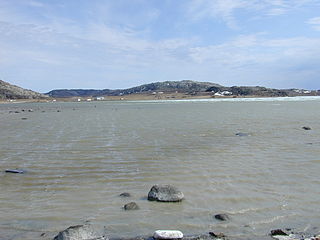
Umingmaktok is a now abandoned settlement located in Bathurst Inlet in the Kitikmeot of the Canadian territory of Nunavut. The community was previously known as Bay Chimo and the Inuit refer to the community as Umingmaktuuq.
Tagak Curley is an Inuk leader, politician and businessman from Nunavut. As a prominent figure in the negotiations that led to the creation of Nunavut, Tagak is considered a living Father of Confederation in Canada. He was born in a hunting camp at Coral Harbour, Northwest Territories.

Kugluktuk is the most western territorial electoral district (riding) for the Legislative Assembly of Nunavut, Canada.
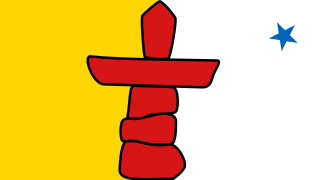
Nunavut is the largest and northernmost territory of Canada. It was separated officially from the Northwest Territories on April 1, 1999, via the Nunavut Act and the Nunavut Land Claims Agreement Act, which provided this territory to the Inuit for self-government. The boundaries had been drawn in 1993. The creation of Nunavut resulted in the first major change to Canada's political map in half a century since the province of Newfoundland was admitted in 1949.

Kugluk/Bloody Falls Territorial Park is located about 15 km (9.3 mi) southwest of Kugluktuk, Nunavut, Canada. The 10 ha park is situated around the Bloody Falls on the Coppermine River and was listed as a national historic site in 1978.
Arctic Co-operatives Limited is a cooperative federation owned and controlled by 32 community-based cooperative business enterprises located in Nunavut, Northwest Territories, Yukon and northern Manitoba, Canada. Arctic Co-ops coordinates resources, consolidates the purchasing power and provides operational and technical support to the community-based co-operatives to enable them to provide a wide range of services to their local member-owners. Arctic Co-ops operates in both English and Inuktitut and provides patronage dividends to the local members.
Asger Rye "Red" Pedersen is a former territorial-level Canadian politician. In 1953, he got a job in the Canadian Arctic with the Hudson's Bay Company (HBC) at Cambridge Bay, Nunavut. In the following year, he was sent to Perry River (Kuugjuak) to assist Stephen Angulalik, the Ahiarmiut Inuit owner of the trading post, with the financial records, inventory and ordering, as Angulalik spoke no English. In 1957, Angulalik sold the Perry River post to the HBC and Pedersen was appointed manager. Angulalik returned to the post after resolving legal problems and worked alongside Pedersen; they became lifelong friends. He was, at one time, married to Lena Pedersen and their grandson, Calvin Pedersen was elected to the Legislative Assembly of Nunavut in July 2020.

Copper Inuit, also known as Inuinnait and Kitlinermiut, are a Canadian Inuit group who live north of the tree line, in what is now the Kitikmeot Region of Nunavut and in the Inuvialuit Settlement Region in the Inuvik Region of the Northwest Territories. Most of them historically lived in the area around Coronation Gulf, on Victoria Island, and southern Banks Island.
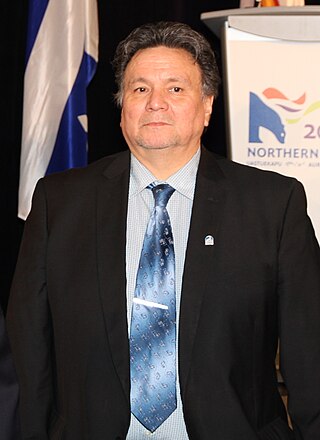
Peter Taptuna is a Canadian politician who served as the third premier of Nunavut from 2013 to 2017.
The Asiak River is a waterway in the Kitikmeot Region of Nunavut in Canada. It flows generally north to Coronation Gulf, an arm of the Arctic Ocean. It runs parallel to the Coppermine River, 29 kilometres (18 mi) to the west.
The Central Arctic was an electoral district of the Northwest Territories, Canada, created in 1966 and abolished in 1983. The district consisted of Pelly Bay, Spence Bay, Gjoa Haven, Cambridge Bay, Bathurst Inlet, Bay Chimo, Coppermine and Holman. For the 1983 election, Holman was moved to the Nunakput district and the others split between Kitikmeot West and Kitikmeot East. Today Holman, now Ulukhaktok, is the only one of the communities in the Northwest Territories as after division the others became part of Nunavut.

Uqqurmiut Centre for Arts & Crafts is an arts centre that was established by the Uqqurmiut Inuit Artists Association in 1990, in Pangnirtung, in the Qikiqtaaluk Region of Nunavut, Canada. The Centre includes a Tapestry Studio, a Craft Gallery, and a Print Shop. In spite of its remote location and small population, numerous Inuit from Pangnirtung have successfully marketed their prints, carvings, sculptures, and textile arts, such as woven wall hangings, to southern collectors. Starting in the 1970s, limited edition prints from the original Print Shop were published annually as the Pangnirtung Prints Collection through the then-Eskimo Co-operative. In 1970 a weaving studio was established and over time the tapestries attracted an international market.
Calvin Avigak Pedersen is a Canadian politician, who was elected to the Legislative Assembly of Nunavut in July 2020. Representing the electoral district of Kugluktuk, he was directly acclaimed to office as the only candidate to register by the nomination deadline following the resignation of his predecessor Mila Adjukak Kamingoak.
References
- 1 2 "Lena (Elizabeth Magdalena) Pedersen First woman elected to the Northwest Territories Council". Library and Archives Canada. April 12, 2005. Archived from the original on October 26, 2016. Retrieved 2016-10-08.
- ↑ Lena Pederson Boarding Home Archived 2011-07-06 at the Wayback Machine
- ↑ Okpik, Abraham (2005-09-29). "The Beginning of Aboriginal Political Organizations". We Call It Survival (PDF). Vol. Life Stories of Northern Leaders Series Volume One. Nunavut Arctic College. pp. 317, 326. ISBN 1-896-204-71-6 . Retrieved 2020-07-27.
...and Leena Pedersen,5 who was an Inuk member of the Legislative Assembly from Coppermine....5. Originally from Greenland, she married Red Pedersen from Cam-bridge Bay.
- ↑ Derek Neary, "New MLAs acclaimed in Baker Lake, Kugluktuk; race set for Pangnirtung mayor". Nunavut News , July 24, 2020.
- ↑ Marybelle Mitchell (1996). Talking Chiefs to a Native Corporate Elite The Birth of Class and Nationalism Among Canadian Inuit (.pdf). McGill-Queen's Press -MQUP. pp. 241–242. ISBN 9780773513747 . Retrieved 2007-11-12.